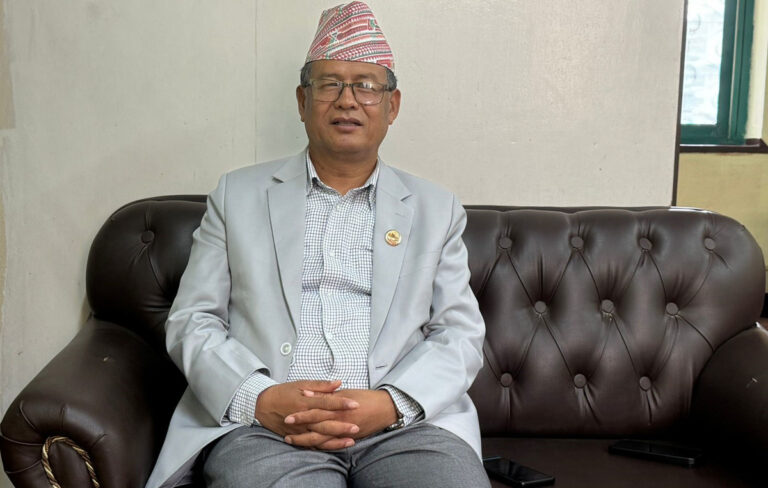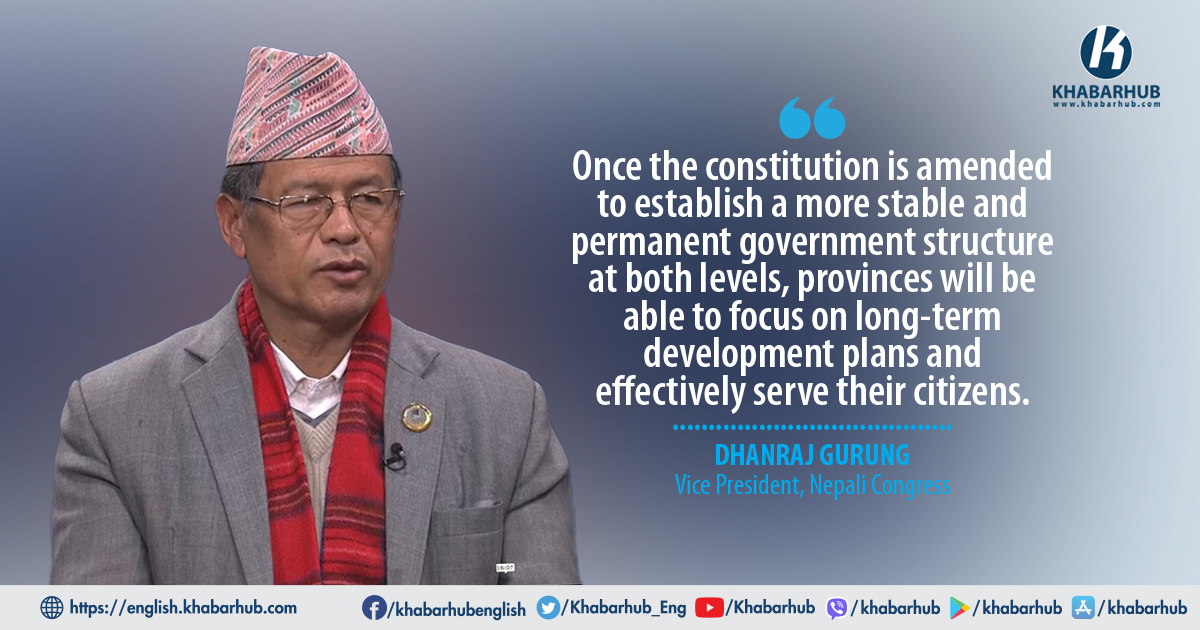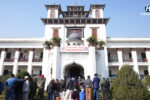KATHMANDU: Vice President of the Nepali Congress (NC), Dhanraj Gurung, has proposed reducing the current 265 seats in the House of Representatives to 165.
In a detailed conversation with Khabarhub on contemporary politics, Gurung, who also served as a Law Minister, suggested eliminating the provision for a 110-member proportional list and instead aligning the representation with the 165 direct constituencies.
Gurung emphasized that constitutional amendment is a key agenda for the coalition government formed with the Nepali Congress and CPN-UML.
However, he noted that the specifics of the amendment still require thorough discussion.
Despite advocating for progressive changes, Gurung assured that the constitutional principles of federalism, republicanism, secularism, and proportional inclusion will be preserved.
In a conversation with Khabarhub on the formation principles and priorities of the Nepali Congress-UML government, Nepali Congress Vice President Gurung shed light on the expected duration of the government, the constitutional amendment agenda, and internal dynamics within the Nepali Congress.
Shekhar Koirala, Gagan Thapa, and other Nepali Congress dissidents have called for major party cooperation, a view shared in Koshi province. Although the Congress-UML alliance reflects their ideas, it was initiated by party President Sher Bahadur Deuba. Is the alliance’s ideology driven by your group or the establishment party?
Dr. Shekhar Koirala expressed that the current political instability is causing public despair, which could potentially undermine the system.
He argued that the Congress-UML alliance should come together to address this instability and ensure political stability.
Koirala has been advocating for this approach even after meeting with the President of UML.
This initiative is not merely a temporary measure. The goal is not only to form a stable government but also to address the long-term issues through a seven-point agreement established during the government formation.
The agreement explicitly aims to address the constitutional shortcomings and problems observed during implementation, seeking broader stability.
Rather than creating an unstable government, it is more effective to amend the constitution with the cooperation of the two major parties.
This would create a conducive environment for political stability and address the current instability.
Without such amendments, frequent changes in ministers and governments will likely prevent effective governance and fail to meet the needs of the Nepalese people.
Dr. Koirala embarked on this path to find a comprehensive solution to these issues.
The proposal to amend the constitution and the discussions between the two parties reflect this intention.
Dr. Koirala has also informed the party chairman about the need to transform public hope into a stable political trajectory, which has facilitated the formation of the current government.
Was party President Deuba ‘convinced’ by Shekhar Koirala’s proposal?
It is unlikely that this initiative would have progressed without NC President Deuba’s support. What is happening now is unfolding in the right direction.
Are there differing opinions within the NC regarding the alliance with UML?
No, the party is unified in its support for and backing of the government.
Will the Congress-UML alliance last until 2084 BS?
This question seems redundant. We have officially agreed that the Congress-UML government will last until 2084 BS.
An agreement was reached between NC party President Deuba and Prime Minister KP Sharma Oli.
To say otherwise would be to undermine our credibility in the eyes of the public.
Both the Prime Minister and our party president are committed to this alliance and want to leave a positive legacy. There is no reason to doubt that this government will fulfill its mission.
What are the main goals of this government?
The government has several key objectives:
Amend the Constitution for stability: The primary goal is to amend the constitution to address the instability that has persisted since its promulgation.
The eight years following its adoption have demonstrated the need for further discussions on achieving political stability.
Transform despair into hope: Since the formation of the Congress-UML government, public despair has shifted to hope. While this change is not miraculous, there is a noticeable increase in optimism.
Economic reform: The country faces significant financial challenges. Despite appearances, the economic situation is dire.
We must work towards improving it to avoid continued negative outcomes, regardless of who is in power.
These priorities are interconnected: Constitutional amendment for stability, good governance to boost hope, and economic reform.
Regarding the coalition of Congress and UML, some theoretical concerns arise, such as whether it might lead to discomfort within the majority parliamentary system. What is your take on this?
Major parties sometimes need to come together for significant achievements.
For example, the constitution was successfully drafted in the Second Constituent Assembly when the major parties collaborated.
The current situation also demands collaboration between the major parties to address constitutional deficiencies, end instability, and improve the economic situation.

We must act proactively rather than allowing the country’s condition to deteriorate further.
The special circumstances necessitate this alliance, and while we do not intend for this to be a permanent arrangement, it is essential for achieving our current goals.
You talked about a “special situation.” How do you address the opposition’s allegations that you are colluding out of fear of a crisis between Congress and UML, especially given that the previous government was providing comprehensive good governance and investigating various scandals?
I believe the opposition’s claims about our actions are misguided. The investigation files that we have opened were already in progress.
For example, the case involving Bhutanese refugees had been open for some time. The Giribandhu Tea eatate issue was resolved and the court published its decision, which did not involve us reopening any files.
Other cases were also under investigation well before our involvement.
The gold smuggling case, which involved a prominent leader, was previously under investigation, and that leader was arrested.
However, after his arrest, the government’s Home Minister instruction his release, citing “state compassion.”
Such decisions undermine the notion of good governance.
If the previous government was failing in its governance, as evidenced by releasing someone involved in a major scandal, it raises questions about their commitment to good governance. We are committed to ensuring that all scandals will be investigated thoroughly.
Opening files is not an end in itself; true good governance means ensuring that all citizens experience it and that foreign investors feel confident in our systems.
For instance, foreign investors often face delays of years, rather than the promised seven days, in obtaining licenses to start industries.
This situation exemplifies the lack of good governance that existed previously.
Our goal is to address these issues, maintain transparency, and ensure that good governance is practiced effectively across all levels.
Are you suggesting that the previous government’s claims of good governance and the accusations against you are incorrect?
Yes, those claims are misleading. Good governance cannot be proven merely through statements; it requires tangible results.
For instance, consider the process of handling files. We’ve seen how these processes can become mired in bureaucracy, as exemplified by the road department’s inefficiencies.
Files move from the rural municipality to the joint secretary and then to the ministry, where branch officers add comments, causing unnecessary delays.
Why can’t we implement a fast-track system? Good governance should be about efficiency and effective service delivery.
For example, if a file is approved by the joint secretary, it should be reviewed directly by the secretary and then forwarded to the minister, rather than getting bogged down with additional comments from branch officers.
This streamlined approach is essential for fast-track processing and true good governance.
When I was a minister, I advocated for such procedures to ensure efficiency. Good governance should be reflected in practical implementation and not just in rhetoric.
The previous government claims they were improving governance, but that is not accurate.
Files were already open before our administration took over. True good governance involves more than just compassionate gestures towards those caught in corruption.
It requires effective and timely action. The previous administration’s efforts to present a façade of progress without real results were misleading.
Since we are currently in the ‘honeymoon period’ of the government, it may not be the best time for a full evaluation. However, the opposition has labeled the government as a ‘government of brokers.’ Can you detail what this government has accomplished so far?
Firstly, the TRC (Truth and Reconciliation Commission) bill, which had been stalled for years despite its significance in the peace agreement, has now been approved by Parliament and signed by the President.
This is a significant achievement. Additionally, the government has made positive strides in the economic sector.
While the improvements may not be immediately visible, the economic situation is gradually improving from where it was.
Some may point to the NEPSE index and criticize the situation based on that, but it’s not the only measure of progress.
Internally, discussions with Ministry of Finance officials indicate positive economic indicators, though we must remain cautious and not become complacent.
The current Prime Minister does not possess a magical solution.
We are addressing and managing the various challenges we face. It is not constructive for the opposition to compare our situation to that of Bangladesh.
If our situation were to deteriorate as drastically as in Bangladesh, it would affect everyone, including Prachanda, Sher Bahadur Deuba, KP Sharma Oli, and ourselves.
We are all in this together, and it is important to avoid contributing to negativity.
The current shift from despair to hope among the people is crucial, and we must work to maintain and build upon this optimism rather than let it slip back into despair.
You mentioned that the Congress-UML government had sparked a sense of hope among the people. However, over the past month and a half, this hope seems to have waned, and Prime Minister Oli appears less energetic and somewhat detached. There are comments suggesting the government is moving at a slow pace. Is the government facing difficulties?
Not at all. We are focusing on action rather than words. We are instructing ministers to emphasize doing over talking.
This message is likely reaching even the party led by the Prime Minister: prioritize work over rhetoric.
When building a house, the foundation is not visible, but once the structure begins to rise, the progress becomes apparent.
The same applies to this government. It has only been a month and a half, and we are still in the phase of laying the groundwork.
Prachanda has questioned whether the government will address issues related to Kulman or if it will neglect the collection of electricity bills. What is the Congress’s stance on this?
The Nepali Congress party firmly believes that industrialists and traders are obligated to pay taxes owed to the state without exception. This is a non-negotiable stance.
Additionally, any issues, including those involving copper versus aluminum wiring in transmitters, must be thoroughly investigated.
There are reports suggesting that aluminum transmitters, which are less durable than copper, may be stockpiled within Kathmandu Valley.
This matter requires investigation to confirm whether aluminum was used in place of copper.
If this substitution was made, it could indicate a scam and potential corruption. Investigations should focus on ensuring that any corruption or mismanagement is addressed, regardless of who is involved.
What is your opinion on the electoral system?
I believe that the current electoral system can be improved. Specifically, the provision for a proportional list of 110 members should be removed.
This is not a call to cancel proportional representation but to adjust it. With 165 constituencies, we should make the representation proportional within those constituencies.
Out of these, 55 seats would be allocated to women, which is exactly 33 percent, aligning with the principle of proportional representation.
The remaining 110 seats should be made fully proportional as well. This approach would allow for more progressive representation.
For instance, in a country with a population of nearly 30 million, reducing the total number of seats to 165 instead of 275 makes the system more efficient and representative.
This system would also ensure that seats are rotated among different groups, including women and various ethnicities.
For example, if a seat is allocated to a woman in one election cycle, it should rotate to another group or gender in subsequent cycles.
This rotation promotes internal harmony and strengthens national unity by ensuring diverse representation.
Is the agreement between Congress and UML aligned with implementing federalism, inclusiveness, proportionality, and secularism as guaranteed by the constitution?
The agreement is not about disregarding these principles but finding the best way to ensure stability and effective governance.
We are exploring alternatives to optimize the implementation of these principles while maintaining the stability of the government.
Is it possible to address the issue raised on secularism in the Constitution?
Regarding secularism, we have addressed it explicitly in Article 4 of the Constitution.
This article emphasizes the preservation and respect for the religion and culture that have been practiced since ancient times.
It strikes a balance by ensuring that traditional practices are respected while also accommodating diverse beliefs.
In addition, Article 26 of the Constitution guarantees religious freedom and prescribes penalties for attempts to forcibly convert individuals to any religion.
These provisions collectively ensure that the state respects all religions equally and upholds the fundamental rights of citizens to practice their faith freely.
Therefore, it’s important to consider these articles together to understand the full scope of the constitutional commitment to secularism and religious freedom.
Reading them in isolation may lead to a misunderstanding of their balanced approach.
There are concerns among some individuals about federalism, with arguments that it has been burdensome or ineffective. What is your perspective on this?
In addressing these concerns, we proposed reducing the number of seats in the Federal House of Representatives to create a more proportional system.
This adjustment would decrease the number of seats in each province and reduce the burden of state expenditures, thereby potentially alleviating some of the financial pressures associated with federalism.
By optimizing the structure, we aim to ensure that federalism becomes more manageable and efficient.
Currently, frequent changes in government at both the federal and provincial levels have led to frustration among the people.
Once the constitution is amended to establish a stable, permanent government structure at both levels, it will enable provinces to focus on long-term development plans and serve their citizens more effectively.
It is important to address and rectify any distortions or inefficiencies in the federal system rather than abandoning it altogether.
Like any system, federalism requires adjustments and improvements to better serve its purpose and meet the needs of the people.
Nepali Congress President Sher Bahadur Deuba has suggested that the Constitution could be amended to make the Vice President the Speaker of the National Assembly. Have there been discussions about this proposal?
Yes, this is a constructive suggestion, and we have discussed it. The role of the Vice President has often been underutilized.
By positioning the Vice President as the Speaker of the National Assembly, we could make better use of this office and reduce overall expenses.
This dual role would not only enhance the Vice President’s involvement in legislative processes but also streamline governance.
While some parties may have differing views on this proposal, it remains an area of discussion.
We are open to exploring such amendments if they contribute to more effective and efficient governance.
Some critics argue that federalism has been problematic, suggesting it has been inefficient and burdensome. What is your response to these concerns?
In addressing these criticisms, I have proposed reducing the number of seats in the Federal House of Representatives to make the system more proportional.
This adjustment would also reduce the number of state assembly seats, leading to smaller, more efficient provincial assemblies.
By streamlining the system in this way, we aim to reduce the financial burden on the state and provide relief to the public.
Additionally, frequent changes in both federal and provincial governments have contributed to public frustration.
Once the constitution is amended to establish a more stable and permanent government structure at both levels, provinces will be able to focus on long-term development plans and effectively serve their citizens.
Rather than dismantling federalism, we should address and correct its existing distortions and inefficiencies. Federalism, like any system, requires continuous refinement to meet its goals effectively.
NC President Deuba has proposed amending the Constitution to make the Vice President the Speaker of the National Assembly. Has this proposal been discussed?
Yes, this is a promising suggestion, and we have discussed it. The Vice President’s role has often been underutilized.
By assigning the Vice President the additional role of Speaker of the National Assembly, we can enhance their involvement in legislative processes and reduce overall expenses.
This dual role would make better use of the Vice President’s position and streamline governance.
While there may be differing opinions from other parties, this proposal will be thoroughly discussed and considered.









Comment